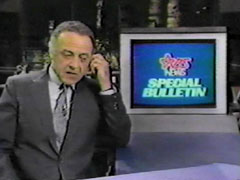Back
when there were only three major tv networks (ABC, CBS, and NBC), there were
television events that large audiences watched.
Some of them were sporting events and others were made-for-tv movies. “Special Bulletin” appeared on March 20, 1983
on “NBC Night at the Movies”. I saw it
that night and did not see it again for four decades. It did stick with me over the years. It was a memorable experience that especially
impacted my generation which grew up in th Cold War. I used to teach a sub-unit on nuclear war in
my American History classes to scare the crap out of my students, but also to help them survive a
nuclear war. Survival involved following
current events and recognizing when a crisis between the U.S. and the USSR
began to escalate. The type of scenario
that I was referring to was covered in two outstanding television movies - “The Day After” and “Threads”. “Special Bulletin” fits in the nuclear war
subgenre, but it deals with a scenario that no one could be prepared for.
The movie was directed by Edward Zwick (“Glory”, “Courage Under Fire”, “The Last Samurai”, “Defiance”). The film reminds of Orson Welles’ radio broadcast of “War of the Worlds”. NBC was determined to avoid the panic that the radio play caused. Since it was structured as a live news broadcast, the network insisted on a disclaimer at the beginning and end. Plus, periodically the word “dramatization” appeared on the screen. Of course, you would assume that any intelligent viewer that tuned in after the opening would have flipped to another network to find that only NBC was reporting on a sensational event. The key word being “intelligent”. It ended up causing only a small amount of panic. The movie created quite a stir, but not on the level of “The Day After”. By “stir” I mean there were some conservatives that were upset that a movie would portray a nuclear bomb as being a bad thing. And why scare people with reality? It won four Emmy awards, including “Outstanding Drama Special”.
The fictional RBS network interrupts its regular schedule for a special bulletin. A reporter and her cameraman happen to be doing a story at Charleston harbor when they are taken captive by some terrorists who have control of a tugboat moored at a pier. There are other hostages as well. The terrorists are Americans who are upset with America’s policy of relying on nuclear weapons to win World War III. The two leaders are scientists who are familiar with nuclear weaponry. One has designed his own nuclear bomb, which is on board the ship. They demand air time to explain their position. They favor unilateral disarmament. They threaten to explode the bomb if the military does not deliver all the triggers for all the nuclear warheads in the Charleston area. They make it clear that their bomb has anti-tamper devices that will prevent anyone other than the maker from disarming it. We are going to find out if he is bluffing.
The movie has a tv news look to it. What I would normally call a low-budget look. While looking authentic, it actually is a low-budget affair. The cast is less than stellar with Ed Flanders as the top-billed. The acting matches the status of the actors, but that makes it seem more believable. They flub their lines as though they are reporting live. I think it is possible that a person could have tuned in midway through and gotten a sick feeling before they realized it was fictional.
“Special Bulletin” fits in well with other movies that deal with nuclear war. And it has a scenario that is possible. The last twenty minutes are edge of your seat. However, it does not pack the wallop of “The Day After” and “Threads” because it does not cover the aftermath of a nuclear explosion like they do. If you have seen either of those two, this one adds the element of “what if you have little warning?” It is noteworthy that before the Oklahoma City bombing, this movie used domestic terrorists as the villains. Well, they certainly don’t think they are villains. They sincerely believe unilateral disarmament would make the world safer. The teleplay does not give them a soapbox, probably to avoid complaints from the Reagan administration. Looking back forty years later, liberals watching the movie today would have to admit that Mutually Assured Destruction actually worked. Go figure. That doesn’t mean that a homemade nuclear bomb is inconceivable.
GRADE = B

Unilateral disarmament is one of those discredited but recurring causes that teaches the wise to beware innocent idealism (if indeed all of its promoters are innocent).
ReplyDelete